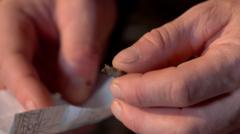The sentencing of former surgeon Joel Le Scouarnec, found guilty of abusing hundreds of young patients, has sparked outrage among victims and advocates in France, who argue that a 20-year term is inadequate for his heinous crimes, especially given the potential for future release.
Outrage over Light Sentence for Infamous French Paedophile Surgeon

Outrage over Light Sentence for Infamous French Paedophile Surgeon
Victims react with horror as Joel Le Scouarnec receives a 20-year prison sentence without preventive detention, raising tough questions about justice and accountability in child abuse cases.
The recent sentencing of former surgeon Joel Le Scouarnec, who was convicted of sexually abusing hundreds of patients over several decades, has left many victims and their advocates shocked and disheartened. The 74-year-old was handed a 20-year prison term, the maximum penalty available under current French law, but there was a significant omission: the court decided against imposing preventive detention, which could have kept him incarcerated even longer after his sentence.
During the trial that concluded this week, Le Scouarnec admitted to committing an appalling number of crimes, including 111 rapes and 188 sexual assaults, many of which involved minors. The prosecution described him as "a devil in a white coat," calling for the court to apply a rare preventive detention provision to ensure he would remain under supervision even after completing his sentence. However, the judge argued that Le Scouarnec's advanced age and his claimed desire to repent were factors to consider, leading to the decision against the preventive measure.
Le Scouarnec will be eligible for parole after serving two-thirds of his sentence, likely placing him on the streets by the year 2032, considering the seven years already served for earlier crimes involving child rape. His attorney attempted to clarify that parole does not guarantee immediate release, but this has done little to soothe the fears of his victims.
Many victims who attended the trial expressed their discontent. One victim asserted, "For a robbery you risk 30 years. But the punishment for hundreds of child rapes is lighter?" This sentiment resonated with child advocacy leaders, including Solène Podevin Favre, who noted the stark inequality in sentencing for such grave offenses.
Marie Grimaud, one of the legal representatives for the victims, acknowledged the legal foundation of the ruling but openly questioned its symbolic weight. Another attorney, Francesca Satta, called for legal reform, arguing that the sentence inadequately reflects the severity of Le Scouarnec's numerous offenses.
Judge Aude Burési countered claims for harsher punishment by stating that while the court understood the victims' desires for permanent confinement, the law offers limitations that they must abide by. The legal system in France does not permit consecutive sentences, which critics argue would lead to a much harsher overall punishment for serial offenders like Le Scouarnec.
Despite the outcry, some legal observers supported the court's decision as a carefully measured response to Le Scouarnec’s psychological profile, emphasizing that preventive detention should remain an exceptional punishment reserved for the most egregious cases.
In the aftermath of the verdict, victims and advocates voiced their frustrations outside the courthouse, with some calling for life sentences for such behaviors to prevent future offenses. The case has reignited troubling discussions surrounding the treatment of child abuse in the French judicial system and whether current laws are adequate to address the needs of victims and the severity of their abusers’ actions.






















